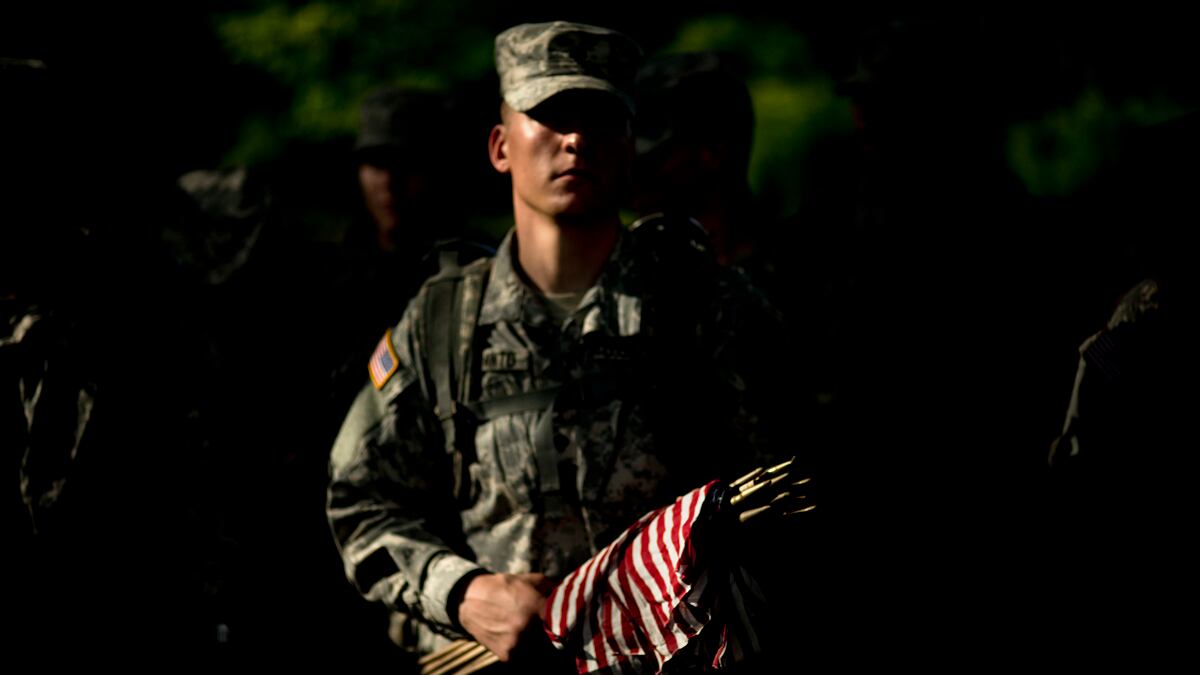On Memorial Day ten years ago, George W. Bush visited the cemeteries of Normandy, where thousands of Americans died on D-Day. “Words can only go so far,” Bush said, “in capturing the grief and sense of loss for the families of those who died in all our wars. For some military families in America and in Europe, the grief is recent, with the losses we have suffered in Afghanistan. They can know, however, that the cause is just and, like other generations, these sacrifices have spared many others from tyranny and sorrow.”
I enlisted in the Army a few months before then, in April of 2002, and when Bush spoke in Normandy I was still in Basic Training. Iraq hadn't been invaded. Afghanistan was a wild west of Special Forces operators on horseback and tribal raids. Still reeling from the traumatic attacks of 9/11, we worried about anthrax letters, shoe bombers, and Weapons of Mass Destruction. We didn't know torture was government policy. The Guantánamo Detention Facility had only been holding prisoners for just four months. The Patriot Act was less than a year old.
Today, Barack Obama is visiting the Vietnam Veterans Memorial to pay honors to the 58,209 Americans who died in a protracted, controversial war in Southeast Asia, and to inaugurate the DOD’s 50th Anniversary commemoration of that same conflict. Only a week ago, NATO leaders met in Chicago to discuss the planned drawdown of forces in Afghanistan and the problem of how to end one of America’s longest wars, which itself is only part of our ongoing global war on terror—or rather, as it was rebranded in 2009, our “Overseas Contingency Campaign.” The NATO leaders in Chicago were confronted by thousands of protesters, including a handful of Iraq and Afghanistan veterans who returned their medals in a symbolic gesture of repudiation and regret.
Memorial Day presents the chance, and the imperative, to ask these questions. Memorial Day began as Decoration Day, honoring and mourning the soldiers who died in the American Civil War. That the holiday now mostly marks the first big barbecue of the summer seems to fit with the fact that less than one-half of one percent of the U.S. population has seen military service any time in the last 10 years. Why should most Americans spend the day in commemoration, when so few they know have served? Memorial Day calls upon us to remember the fallen, but for most the dead fell in the shadows of ignorance, confusion, and corruption. It’s hard to know why, how, or even what to remember beyond the traditional moment of silence at 3 p.m.

How do we remember our wars and our dead? What stories do we tell ourselves about the costs of political violence?
The problem of distance is compounded by distraction and disjunction. Memory and history are funny: generally reliable, they're also shockingly pliable, and often wrong on details. Changing a memory is as easy as repeating a slip of the tongue, confusing where you learned something, or having someone else reinforce a misapprehension. Even those of us who do know someone who served, or who served ourselves, may struggle with a half-forgotten name, a traumatic event grown tangled with the less messy version we tell people, or the mind-numbingly simplistic narratives pounded into our brains daily by the news cycle, spectacular politics, and government propaganda.
President Obama’s visit to the Vietnam Veterans Memorial today and the 50th Anniversary Commemoration campaign launched by the Department of Defense are good examples of the way history and memory warp under the pressures of the present. As Obama speaks today, we won’t be able to help but think of Afghanistan. With the stories ringing in our ears of mistreated and victimized veterans coming home from the Mekong Delta and the A Shau Valley, we won’t be able to help but feel the need to do it better this time: to thank the veterans coming home from Afghanistan for their service, their courage, and their sacrifices. On this Memorial Day, we’re being called to turn away from questions about why we were in Afghanistan, or whether it was a success, or if anything was worth the tens of thousands of dead the war felled, or what the ultimate domestic costs of that war might be, and remember rather how important it is to bring our boys home.
But the veterans giving back their medals in Chicago last week suggest a different, more complicated story. Even though they too are replaying old tapes from the Vietnam era (remember the brouhaha about John Kerry returning his ribbons), the veterans in Chicago are testimony to the fact that Iraq and Afghanistan are in many ways unlike the war in Vietnam, not least because those listed on the Wall in D.C. were subject to a national draft, while we veterans of Iraq and Afghanistan joined because we wanted to.
We don't know how many Afghans have died overall because of our war there—at least 11,000 since 2007—but on Memorial Day 10 years ago, most of them were still alive. More than 160,000 Iraqis got up and went to work, not knowing that within 10 years they'd be dead. More than 6,000 U.S. service members looked ahead to the rest of their lives, ignorant of the day and hour—now fixed—when they'd fall overseas. How do we remember? How can we? How can we hold in our minds this impossible disjunction between the unknown future 10 years ago, and the inevitable past of the last decade?
George Orwell famously wrote: “Who controls the past controls the future; who controls the present controls the past.” As we listen to the president today, we should think about how the past is being presented. The government’s 50th anniversary commemoration of the conflict in Vietnam marks a date that doesn’t exist. That war began in Vietnamese resistance to Japanese occupiers in World War II, then continued against French colonialists and American “liberators.” American advisers were in-country as early as the mid-1950s. In fact, the Department of Defense recognized “the establishment of the Military Assistance Advisory Group, Vietnam, on Nov. 1, 1955,” as the beginning of the conflict, even though it wasn’t until Congress’s all-but-unanimous passing of the Gulf of Tonkin resolution in 1964 that President Johnson was authorized to use military force. With the impossibility of pinning down a factual start date for a war that was never declared, the question of why a certain date is picked to represent the war—or to serve as its day of remembrance—rises with striking acuteness. Although it was George Bush who signed the 2008 National Defense Authorization Act founding The Vietnam War Commemoration, it’s Obama who’s now profiting from it, reshaping the public memory of one war to help stage-manage the public memory of another.
How we will remember the wars that shaped the first decade of the 21st century is a question we cannot let be answered by electoral politics or our own lack of attention. The past is the foundation of our future. On this Memorial Day, we need to take hold of that past and remember that we cannot be passive consumers of history, but must make it, together: by telling our stories, by listening closely to others, and by critically questioning the stories we're being told.




